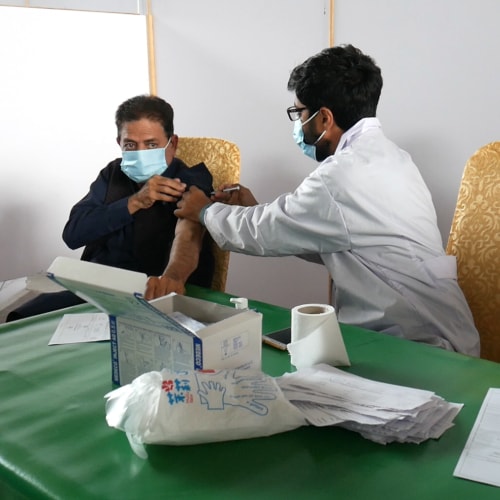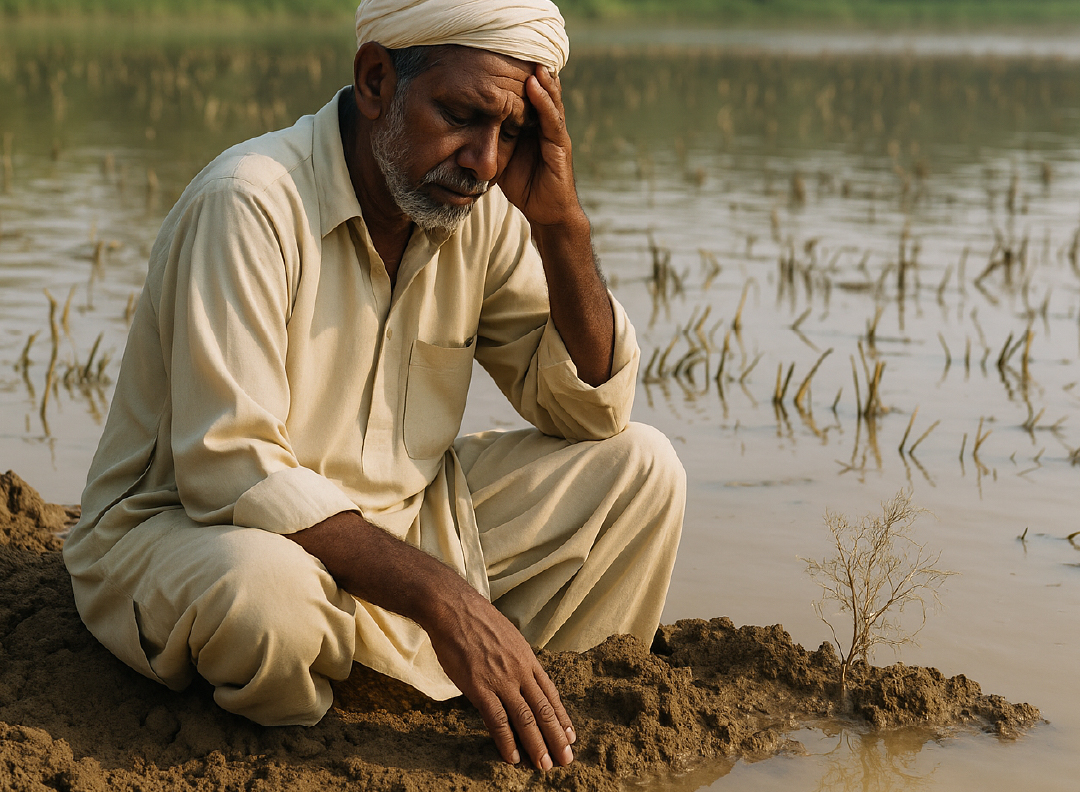Doctors Hospital, a large private sector healthcare facility in Lahore, started administering a Russia-made vaccine, Sputnik-V, on 1st April 2021 to those who want to protect themselves from corona virus – and can pay for it. The hospital is charging 12,500 rupees for two doses of the vaccine.
Two private hospitals in Karachi, South City and OMI, are also administering the same vaccine – though at different prices. South City, for instance, is charging 17,268 rupees for administering two doses of the vaccine.
Where has the vaccine come from?
The management of the Doctors Hospital refuses to divulge its source but one of its staff member says: “We have procured the vaccine from an authorized entity and that is all that should matter”. Other hospitals, too, maintain silence in response to the question.
Only hours before these healthcare facilities started administering the vaccine, Sindh High Court had permitted a Karachi-based private company, Ali Gohar Pharmaceuticals, to start supplying Sputnik-V to market. The company has imported 50,000 doses of the vaccine but was engaged in a dispute with the government over its pricing.
Resolving the dispute temporarily, the high court said the company could sell two doses of the vaccine at 12,268 rupees even though the Drug Regulatory Authority of Pakistan (DRAP) has set its price at 8,449 rupees for the same number of doses. Ordering DRAP to determine the price again within seven days, the court said: “At this stage, it is against public interest to stop the sale of the corona virus vaccine”.
It also told Ali Gohar Pharmaceuticals to maintain an elaborate record of its sales, biding it to refund to the consumers the difference between the price it is charging and the one that DRAP will fix.
Price wars
The pricing dispute goes back to the day when Ali Gohar Pharmaceuticals imported the vaccine and approached the government to fix its price. Its origin lies in the federal government’s decision, made in February 2021, that the private sector could import corona vaccine and set its price on its own. That decision, though, was reversed subsequently after public criticism that the removal of any cap on the vaccine price will allow private sector to keep it exorbitantly high.
On 18th March, the government said the price would now be fixed under a formula that allows importers to charge 40 percent over and above the price at which they have purchased the vaccine. Consequently, DRAP set the maximum retail price of the vaccine at 8,449 rupees for a pack of two shots.
This price came a day after the arrival of the imported vaccine in Karachi on 17th March. Ali Gohar Pharmaceuticals instantly rejected it. It stated the government had deemed the vaccine’s purchase price to be 20 US dollars (or 3,100 rupees) for two doses but, it claimed, its actual purchase price was 45 US dollars (or 6,975 rupees).
The company said, if it did not get a suitable price, it will either send the vaccine back to where it was imported from or sell it to a buyer willing to give a better price.
The stand-off soon moved to Sindh High Court. The lawyer representing Ali Gohar Pharmaceuticals contended there that the DRAP price did not apply to the vaccine imported by his client because it was brought inside the country before the price was announced.
The controversy did not go unnoticed outside the court. Transparency International Pakistan (TIP), a civil society organization focused at highlighting corruption in government institutions, wrote a letter to the Ministry of National Health Services and stated the vaccine was available in international market at 10 US dollar per single dose. By over-quoting its import price as 45 US dollars for two doses, Ali Gorar Pharmaceuticals was indulging in a corrupt practice, TIP alleged.
Its letter drew attention to the price of two shots of Sputnik-V in India – 1,464 Indian rupees or 3063 Pakistani rupees -- and stated that even the DRAP price (8,449 rupees) was 2.75 times higher than that. This, the letter said, was a violation of the drug pricing policy which provides for using prices in Bangladesh and India as a “reference”.
Going by this policy, the price of two doses of vaccine should not have been more than 4800 rupees (calculated as international market price + packaging price + plus 40 percent profit), TIP claimed.
Aamir Ashraf Khawaja, secretary of the National Health Services department, did respond to the TIP letter but focused mostly on how the government was fighting off corona virus. He stated the government had fixed the retail price of the vaccine making room for competition among private importers (though, so far, there is no competition in the market as the vaccine is being imported by just one company). He also said the government’s earlier decision to put no cap on the vaccine price was caused by the fact that no reference price was available at that time. Once the reference price became available, he said, the pricing formula had to be reset as per the provisions of the drug pricing policy.
TIP was not convinced. It wrote back to the ministry, stating that reference prices had become available by the turn of the year but DRAP ignored them altogether. It said a Russian government entity, the Russian Direct Investment Fund (RDIF), had announced the retail price of a single dose of Sputnik-V to be 10 US dollars – or 20 US dollars for two doses -- as early as the middle of November 2020. Secondly, it said, India, too, declared the retail price of the single dose of the same vaccine at less than 734 Indian rupees on 13th January 2021.
Privilege and pandemic
Pakistan is one of the very few countries which are importing corona vaccines privately -- others being Lebanon, Indonesia and the Philippines. In many other countries, the governments have taken up the responsibility of either importing or manufacturing corona vaccines to inoculate their citizens.
Most of the poor countries, meanwhile, are relying on vaccine imports under a global programs called Covax. This program is a collaboration between the World Health Organization (WHO), Gavi which is an international alliance to facilitate vaccination in poor countries, and the Coalition for Epidemic Preparedness Innovations which is a Switzerland-based foundation.
Under Covax, Pakistan is scheduled to receive a little more than 14.6 million doses of corona vaccines – the highest number of doses being given to any country. The second highest number of doses -- 13.65 million -- will be provided to Nigeria. Then come Indonesia (11.7 million does), Bangladesh (10.9 million doses) and Brazil (9.1 million doses).
But this program is facing a lot of problems. For one, most of the vaccines under it are being mass produced in India. The manufacturers there are complaining that they are under pressure to provide the vaccines first to their own country’s government because India is among the top three countries hardest hit by corona virus – only behind the United States and Brazil -- and requires hundreds of millions of doses of vaccine to inoculate its 1.2 billion people. Secondly, they say they are facing the shortage of various raw materials due to constraints in international trade.
In the absence of bulk supplies under COVAX, Pakistan is relying on China for the free delivery of its Sinopharm vaccine. China has already provided Pakistan with 500,000 doses of the vaccine and has promised recently to send another 500,000 doses. It is with this donation that the government is inoculating its health workers and also the people above the age of 50.
But it can only cater to less than 0.25 percent of Pakistan’s total population. Here is how.
Vaccine price will be unaffordable for a vast majority of Pakistanis Given Pakistan’s demographics, the number of Pakistanis who are more than 50 years old is easily above 15 million. A whopping 30 million doses of vaccine will be required to vaccinate all of them. Also, to achieve a collective immunity against corona virus, Pakistan will have to vaccinate more than 60 per cent of its population – or close to 140 million people – which requires 280 million doses of the vaccine.
Can private sector import all the vaccine doses needed in the country? Even if it starts importing the vaccine in bulk immediately, its prices will be unaffordable for a vast majority of Pakistanis. The numbers, indeed, are stark.
According to the Pakistan Bureau of Statistics, a government organization, the average monthly household income in Pakistan was 41,545 rupees in 2019. Given that the average household size in the country, as per the latest official census, is 6.7 persons and given that the price of two doses of Sputnik-V vaccine is 12,268 rupees, every household will need 82,195 rupees for vaccination. In other words, an average household will have to forgo all its existing expenses for two full months to be able to vaccinate all its members.
The Association of Physicians of Pakistani Descent of North America (APPNA), representing 17,000 physicians and health care professionals of Pakistani origin who are working in the United States and Canada, has written a letter to Prime Minister Imran Khan to express its concern over this situation. Underscoring the fact that around 60 million Pakistanis live below the poverty line as per the government’s own estimates, APPNA said the government’s vaccine policies would only worsen the corona pandemic in Pakistan.
In any case, this policy will soon have the obvious result of creating a vaccine divide – between a tiny minority that can afford to have it privately and an overwhelming majority that can only wait.
TIP, therefore, calls the government policy as “dysfunctional”. It alleges that permitting the private sector to import and administer the vaccine at market prices suggests “malicious intent”.
What can still be done?
The three other countries which are allowing the private sector to import the vaccine have adopted a strategy totally different from the one being followed by Pakistan. Indonesia, the Philippines and Lebanon, all, have allowed private businesses to import the vaccine only to vaccinate their own employees free of cost and not sell it in open market.
Overall, the path the governments are taking across the globe to vaccinate their people is procuring the vaccine with public funds and making it available free to all and sundry. Initially, the government of Pakistan, too, allocated 24 billion rupees to purchase the vaccine but the secretary of the National Health Services, Aamer Ashraf Khawaja, said in March this year that the government has no plan of purchasing any vaccine – not at least in 2021.
Unsurprisingly, Pakistan is running far behind its neighbors in the vaccination drive. Our World In Data, an online publication that focuses on global policy issues, states that Pakistan is ranked second from below among the eight South Asian countries as far as the percentage of people vaccinated so far is concerned.
But even if Pakistan starts procuring the vaccine with public funds, it has allocated much less than required money for that. Pakistan Institute of Development Economics (PIDE), a government-funded think-tank based in Islamabad, states in a recent report that 24 billion rupees allocated so far can buy only a fraction of the vaccine doses the country needs. Pakistan requires 274 million doses to vaccinate all its 137 million people who are above the age of 18, it says.
This means the government must allocate 2.74 billion US dollars to acquire these does (given that each of them costs 10 US dollars). On the contrary, it has allocated only 15.8 million US dollars (at today’s currency prices).
Umair Mukhtar, who works as director communication at Ali Gohar Pharmaceuticals, says private sector can share some of this financial burden. Arguing that those who can afford private vaccination must be given this option, he says: “Even if three percent of the total population can afford to pay for the vaccine, having them vaccinated will increase the total number of people saved from corona virus”.
Sajid Shah, an information officer at the Ministry of National Health Services, agrees with Mukhtar. He says the government is taking one step at a time to ensure a “majority of Pakistan’s population is vaccinated by the end of this year”.
Shah claims, criticism notwithstanding, the government has successfully handled the provision of personal protection equipment (PPE) for healthcare workers even though it was in a very short supply at the beginning of the pandemic. He also points out the government is providing free treatment to almost all the corona patients although many analysts and journalists doubted that it could do so. Similarly, he proclaims, the vaccination issue will also be handled successfully in due course of time.
The audacity of his claim is astounding. The government certainly needs to keep in mind Pakistan’s embarrassing failure to achieve 100 percent vaccination against polio virus – in well over three decade.
This report was first published by Lok Sujag on 5 Apr 2021, on its old website.
Published on 22 Mar 2022



















